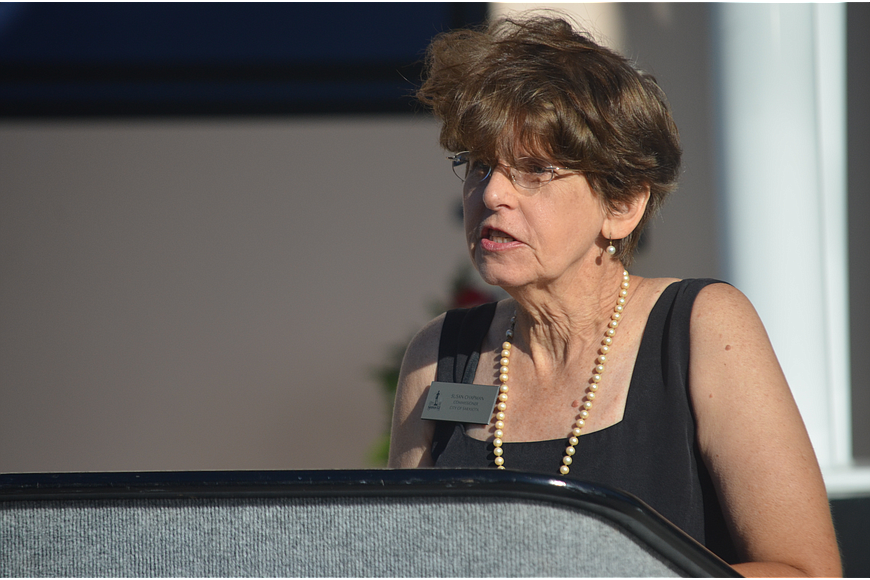- April 19, 2024
-
-
Loading

Loading

For nearly three years, City Commissioner Susan Chapman fought an allegation that she violated the Florida Sunshine law, arguing that her case could set precedent for elected officials throughout the state.
After a judge ruled Friday on the case, it’s unclear what precedent — if any — will come out of it.
Judge Brien Iten’s ruling was good news for Chapman. He wrote that Chapman’s attendance at a community meeting regarding homelessness did not constitute a Sunshine law violation, dismissing a claim brought by the group Citizens for Sunshine.
Citizens for Sunshine, represented by attorney Andrea Mogensen and assisted by legal consultant Michael Barfield, argued that Chapman violated state law by attending an Oct. 10, 2013, meeting of downtown merchants. Commissioner Suzanne Atwell attended the same meeting, held at Tsunami Sushi & Hibachi Grill, and settled her portion of the suit quickly after it was filed in 2013.
Because Chapman knew Atwell would attend, and the private meeting concerned a topic likely to come before the City Commission, the suit asserted Chapman’s attendance violated the law.
But city officials were concerned that such an interpretation of the law would prevent multiple commissioners from attending events like neighborhood association meetings without public notice and someone present to take minutes.
In that regard, the ruling was good for the city: Iten described Chapman’s attendance as “passive,” concluding she and Atwell did not discuss the issue of homelessness. He determined that the gathering did not constitute a meeting under the definition provided in the Florida Constitution.
“To find otherwise would lead to an absurd result, which is what a court is compelled to avoid when applying the law,” Iten wrote.
As the city awaited a ruling, it took the cautionary step of noticing all meetings about topics likely to come before the City Commission that multiple commissioners planned to attend — even if they didn’t plan to discuss that topic. City Attorney Robert Fournier said the city could likely end that practice if the ruling stands.
But Barfield has already said that Citizens for Sunshine plans to appeal the ruling. As a result, the city will continue its current procedure for noticing meetings.
“Until we get something out of the District Court of Appeals, it’s not going to be binding in the circuit,” Fournier said.
Iten’s ruling does suggest that, if other public officials find themselves in a similar situation as Chapman, he or she should leave the meeting to avoid even the appearance of potential impropriety. Barfield remains convinced Chapman’s behavior violated the Sunshine law.
“We don’t believe the court’s factual findings, which are entirely favorable to our client, could be squared with the ultimate legal conclusion,” Barfield said.
“The judgment confirms the Sunshine law was not intended to be a millstone around the necks of public representatives.” — Thomas Shults
The city spent nearly $347,000 to defend Chapman. She will attempt to recover legal expenses from Citizens for Sunshine in a second portion of the suit. Following the ruling, Chapman’s belief that a verdict was worth pursuing hasn’t wavered.
“The reason I didn’t settle was because I thought it was an important issue for representative government, and it would impact elected official behavior statewide,” Chapman said.
Attorney Thomas Shults, who represented Chapman, said the decision was a firm rebuke of Citizens for Sunshine’s interpretation of the state law — even considering Iten’s admonition at the end of his ruling.
“It’s a good day for representative democracy,” Shults said. “The judgment confirms the Sunshine law was not intended to be a millstone around the necks of public representatives.”
Based on Iten’s judgment, Shults wasn’t troubled by Barfield’s intent to appeal.
“It is a very well-reasoned final judgment,” Shults said. “We’re confident it will be affirmed if an appeal is filed.”